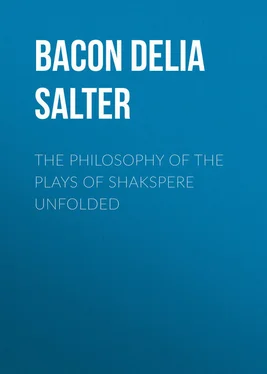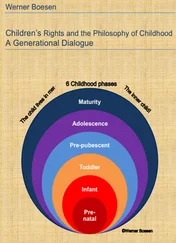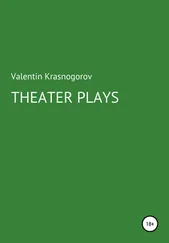Delia Bacon - The Philosophy of the Plays of Shakspere Unfolded
Здесь есть возможность читать онлайн «Delia Bacon - The Philosophy of the Plays of Shakspere Unfolded» — ознакомительный отрывок электронной книги совершенно бесплатно, а после прочтения отрывка купить полную версию. В некоторых случаях можно слушать аудио, скачать через торрент в формате fb2 и присутствует краткое содержание. Жанр: literature_19, foreign_antique, foreign_prose, на английском языке. Описание произведения, (предисловие) а так же отзывы посетителей доступны на портале библиотеки ЛибКат.
- Название:The Philosophy of the Plays of Shakspere Unfolded
- Автор:
- Жанр:
- Год:неизвестен
- ISBN:нет данных
- Рейтинг книги:3 / 5. Голосов: 1
-
Избранное:Добавить в избранное
- Отзывы:
-
Ваша оценка:
- 60
- 1
- 2
- 3
- 4
- 5
The Philosophy of the Plays of Shakspere Unfolded: краткое содержание, описание и аннотация
Предлагаем к чтению аннотацию, описание, краткое содержание или предисловие (зависит от того, что написал сам автор книги «The Philosophy of the Plays of Shakspere Unfolded»). Если вы не нашли необходимую информацию о книге — напишите в комментариях, мы постараемся отыскать её.
The Philosophy of the Plays of Shakspere Unfolded — читать онлайн ознакомительный отрывок
Ниже представлен текст книги, разбитый по страницам. Система сохранения места последней прочитанной страницы, позволяет с удобством читать онлайн бесплатно книгу «The Philosophy of the Plays of Shakspere Unfolded», без необходимости каждый раз заново искать на чём Вы остановились. Поставьте закладку, и сможете в любой момент перейти на страницу, на которой закончили чтение.
Интервал:
Закладка:
As to Ben Jonson, and the evidence of his avowed admiration for the author of these plays, from the point of view here taken, it is sufficient to say in passing, that this man, whose natural abilities sufficed to raise him from a position hardly less mean and obscure than that of his great rival, was so fortunate as to attract the attention of some of the most illustrious personages of that time; men whose observation of natures was quickened by their necessities; men who were compelled to employ 'living instruments' in the accomplishment of their designs; who were skilful in detecting the qualities they had need of, and skilful in adapting means to ends. This dramatist's connection with the stage of course belongs to this history. His connection with the author of these Plays, and with the player himself, are points not to be overlooked. But the literary history of this age is not yet fully developed. It is enough to say here, that he chanced to be honored with the patronage of three of the most illustrious personages of the age in which he lived. He had three patrons. One was Sir Walter Raleigh, in whose service he was; one was the Lord Bacon, whose well nigh idolatrous admirer he appears also to have been; the other was Shakspere , to whose favor he appears to have owed so much. With his passionate admiration of these last two, stopping only 'this side of idolatry' in his admiration for them both, and being under such deep personal obligations to them both, why could he not have mentioned some day to the author of the Advancement of Learning, the author of Hamlet – Hamlet who also 'lacked advancement?' What more natural than to suppose that these two philosophers, these men of a learning so exactly equal, might have some sympathy with each other, might like to meet each other. Till he has answered that question, any evidence which he may have to produce in apparent opposition to the conclusions here stated will not be of the least value.
These are questions which any one might properly ask, who had only glanced at the most superficial or easily accessible facts in this case, and without any evidence from any other source to stimulate the inquiry. These are facts which lie on the surface of this history, which obtrude themselves on our notice, and demand inquiry.
That which lies immediately below this surface, accessible to any research worthy of the name is, that these two so new extraordinary developments of the modern philosophy which come to us without any superficially avowed connexion, which come to us as branches of learning merely, do in fact meet and unite in one stem, 'which has a quality of entireness and continuance throughout,' even to the most delicate fibre of them both, even to the 'roots' of their trunk, 'and the strings of those roots,' which trunk lies below the surface of that age, buried, carefully buried, for reasons assigned; and that it is the sap of this concealed trunk, this new trunk of sciences, which makes both these branches so vigorous, which makes the flowers and the fruit both so fine, and so unlike anything that we have had from any other source in the way of literature or art.
The question of the authorship of the great philosophic poems which are the legacy of the Elizabethan Age to us, is an incidental question in this inquiry, and is incidentally treated here. The discovery of the authorship of these works was the necessary incident to that more thorough inquiry into their nature and design, of which the views contained in this volume are the result. At a certain stage of this inquiry, – in the later stages of it, – that discovery became inevitable. The primary question here is one of universal immediate practical concern and interest. The solution of this literary problem, happens to be involved in it. It was the necessary prescribed, pre-ordered incident of the reproduction and reintegration of the Inductive Philosophy in its application to its 'principal' and 'noblest subjects,' its 'more chosen subjects.'
The HISTORICAL KEY to the Elizabethan Art of Tradition, which formed the first book of this work as it was originally prepared for the press, is not included in the present publication. It was the part of the work first written, and the results of more recent research require to be incorporated in it, in order that it should represent adequately, in that particular aspect of it, the historical discovery which it is the object of this work to produce. Moreover, the demonstration which is contained in this volume appeared to constitute properly a volume of itself.
Those who examine the subject from this ground, will find the external collateral evidence, the ample historical confirmation which is at hand, not necessary for the support of the propositions advanced here, though it will, of course, be inquired for, when once this ground is made.
The embarrassing circumstances under which this great system of scientific practice makes its appearance in history, have not yet been taken into the account in our interpretation of it. We have already the documents which contain the theory and rule of the modern civilisation, which is the civilisation of science in our hands. We have in our hands also, newly lit, newly trimmed, lustrous with the genius of our own time, that very lamp with which we are instructed to make this inquiry, that very light which we are told we must bring to bear upon the obscurities of these documents, that very light in which we are told, we must unroll them; for they come to us, as the interpreter takes pains to tell us, with an 'infolded' science in them. That light of ' times ,' that knowledge of the conditions under which these works were published, which is essential to the true interpretation of them, thanks to our contemporary historians, is already in our hands. What we need now is to explore the secrets of this philosophy with it, – necessarily secrets at the time it was issued – what we need now is to open these books of a new learning in it, and read them by it.
In that part of the work above referred to, from which some extracts are subjoined for the purpose of introducing intelligibly the demonstration contained in this volume, it was the position of the Elizabethan Men of Letters that was exhibited, and the conditions which prescribed to the founders of a new school in philosophy, which was none other than the philosophy of practice, the form of their works and the concealment of their connection with them – conditions which made the secret of an Association of 'Naturalists' applying science in that age to the noblest subjects of speculative inquiry, and to the highest departments of practice, a life and death secret. The physical impossibility of publishing at that time, anything openly relating to the questions in which the weal of men is most concerned, and which are the primary questions of the science of man's relief, the opposition which stood at that time prepared to crush any enterprise proposing openly for its end, the common interests of man as man, is the point which it was the object of that part of the work to exhibit. It was presented, not in the form of general statement merely, but in those memorable particulars which the falsified, suppressed, garbled history of the great founder of this school betrays to us; not as it is exhibited in contemporary documents merely, but as it is carefully collected from these, and from the traditions of 'the next ages.'
That the suppressed Elizabethan Reformers and Innovators were men so far in advance of their time, that they were compelled to have recourse to literature for the purpose of instituting a gradual encroachment on popular opinions, a gradual encroachment on the prejudices, the ignorance, the stupidity of the oppressed and suffering masses of the human kind, and for the purpose of making over the practical development of the higher parts of their science, to ages in which the advancements they instituted had brought the common mind within hearing of these higher truths; that these were men whose aims were so opposed to the power that was still predominant then, – though the 'wrestling' that would shake that predominance, was already on foot, – that it became necessary for them to conceal their lives as well as their works, – to veil the true worth and nobility of them, to suffer those ends which they sought as means, means which they subordinated to the noblest uses, to be regarded in their own age as their ends ; that they were compelled to play this great game in secret, in their own time, referring themselves to posthumous effects for the explanation of their designs; postponing their honour to ages able to discover their worth; this is the proposition which is derived here from the works in which the tradition of this learning is conveyed to us.
Читать дальшеИнтервал:
Закладка:
Похожие книги на «The Philosophy of the Plays of Shakspere Unfolded»
Представляем Вашему вниманию похожие книги на «The Philosophy of the Plays of Shakspere Unfolded» списком для выбора. Мы отобрали схожую по названию и смыслу литературу в надежде предоставить читателям больше вариантов отыскать новые, интересные, ещё непрочитанные произведения.
Обсуждение, отзывы о книге «The Philosophy of the Plays of Shakspere Unfolded» и просто собственные мнения читателей. Оставьте ваши комментарии, напишите, что Вы думаете о произведении, его смысле или главных героях. Укажите что конкретно понравилось, а что нет, и почему Вы так считаете.












